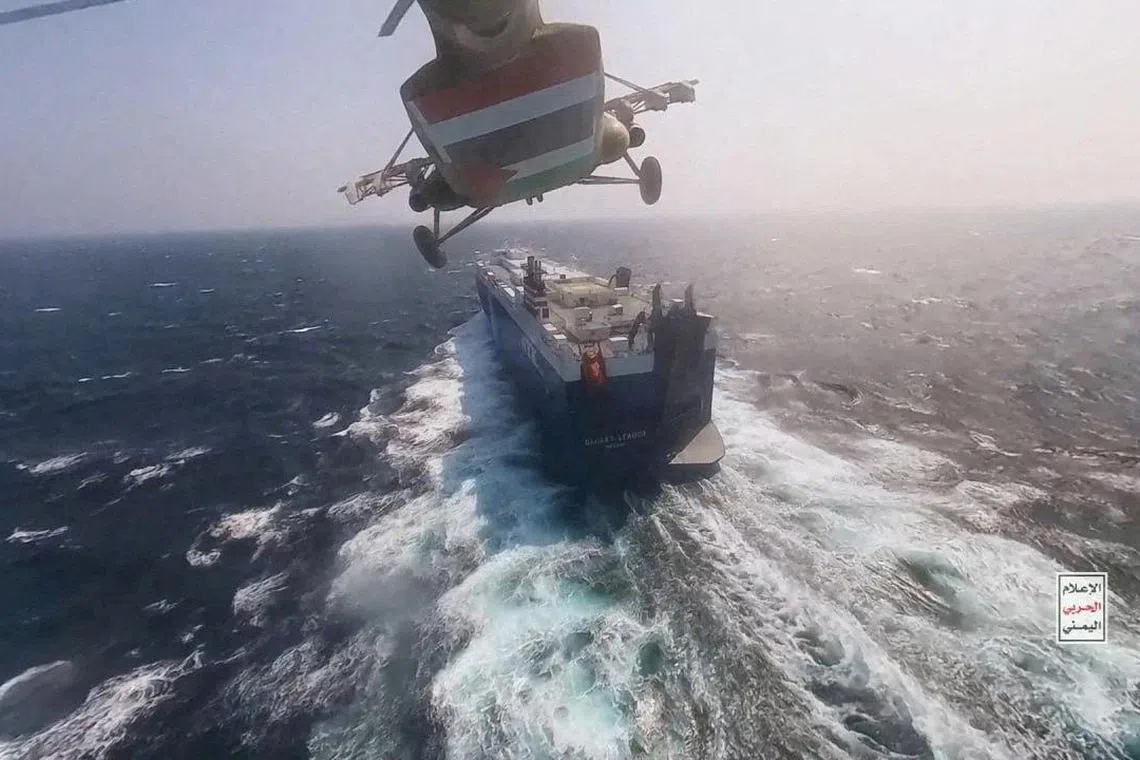US launches Red Sea force as ships reroute to avoid attacks
Sign up now: Get ST's newsletters delivered to your inbox

Houthi military helicopter flies over the Galaxy Leader cargo ship in the Red Sea in this photo released on Nov 20.
PHOTO: REUTERS
MANAMA - US Defence Secretary Lloyd Austin said on Dec 19 that the United States was leading a multinational operation to safeguard commerce in the Red Sea as attacks by Iran-backed Yemeni Houthi militants forced more major shipping companies to reroute.
The Houthis have stepped up the missile and drone attacks they began in November against international vessels sailing through the Red Sea, in response to Israel’s assault on the Gaza Strip
The attacks this week forced oil major BP and a slew of freight firms including Maersk to divert shipments normally made through the Suez Canal around the Cape of Good Hope, adding days to journey times and incurring higher costs
Israel’s 10-week-old war with Hamas, the Palestinian group that controls Gaza, has drawn in the US and its allies on the side of Israel, and Iran and its Arab proxy forces on the side of Hamas, risking a wider regional conflict.
Mr Austin, who is on a trip to Bahrain, home to the US Navy’s headquarters in the Middle East, said Britain, Bahrain, Canada, France, Italy, Netherlands, Norway, Seychelles and Spain were among nations involved in the Red Sea security operation.
The group will conduct joint patrols in the southern Red Sea and the Gulf of Aden.
“This is an international challenge that demands collective action,” Mr Austin said in a statement, announcing the initiative as Operation Prosperity Guardian.
In a virtual meeting with ministers from more than 40 nations, Mr Austin called on other countries to contribute as he condemned “reckless Houthi actions”.
Mr Austin’s announcement however leaves many questions unanswered, including how many other countries are willing to do what mostly US warships have done in recent days – shoot down Houthi missiles and drones, and rush to the aid of commercial ships under attack.
France later said it would join the effort to stop Houthi attacks.
Shipping companies continued to reroute on Dec 19 despite Mr Austin’s announcement. Denmark’s Maersk, which had paused Red Sea shipping, said it would sail its ships around Africa until further notice.
“We have faith that a solution enabling a return to using the Suez Canal and transiting through the Red Sea and Gulf of Aden will be introduced in the near future, but at this time it remains difficult to determine exactly when this will be,” it said in a statement.
Many other ships were still plying the waterway. Several ships underway have armed guards on board, LSEG data showed.
Industry sources said the impact on global trade would depend on how long the crisis persists, but insurance premiums and longer routes would be immediate burdens.
Attacks persist, ships reroute
The Houthis, who control large areas of impoverished Yemen, have threatened to target all ships heading to Israel, regardless of their nationality, and warned international shipping companies against dealing with Israeli ports. They have also fired missiles at Israel more than 2,000km away.
The group said on Dec 19 the US-led security initiative would not deter them.
British maritime security firm Ambrey said on Dec 19 it received information of a potential boarding attempt 27km west of Yemen’s Aden port city, adding that the attack was unsuccessful and all crew were safe.
The United Kingdom Maritime Trade Operations said in an advisory it had received a report of an incident 80 nautical miles northeast of Djibouti, at the mouth of the Red Sea.
The US Navy already had a Red Sea task force that had bolstered its presence in the critical waterway, and it is unclear how many countries will send additional ships or patrol aircraft following the creation of the new maritime operation.
The leadership of the new US-led operation will also fall under existing command structures, officials say.
Many key Arab allies of the US have so far declined to join.
The Houthis on Dec 18 claimed a drone attack on two cargo vessels in the region. The Houthis have said that they were prepared to confront any coalition formed by the US.
About 12 per cent of world shipping traffic normally transits via the Suez Canal, the shortest shipping route between Europe and Asia, passing then as well into the Red Sea waters off Yemen.
Oil major BP’s decision to temporarily pause all transit through the Red Sea, and oil tanker group Frontline saying its vessels would avoid passage through the waterway, showed the crisis was broadening to include energy shipments. Crude oil prices rose on those concerns on Dec 18.
Western countries back Israel’s fight against Hamas after the group killed 1,200 Israelis in an Oct 7 attack. Israel’s military response, a heavy bombardment and invasion of Gaza, has killed more than 19,000 Palestinians.
During a visit to Israel on Dec 18, Mr Austin squarely blamed Iran for the Houthi attacks.
“Iran’s support for Houthi attacks on commercial vessels must stop,” he said.
In addition to the Houthi attacks, Iran’s ally Hezbollah in Lebanon has fired rockets across the frontier with Israel. Israel has launched air strikes in response in the worst violence at the frontier since a 2006 Israel-Hezbollah war.
At a news conference in Tel Aviv, Mr Austin said: “As we are driving to stabilise the region, Iran is raising tensions by continuing to support terrorist groups and militias.” REUTERS


